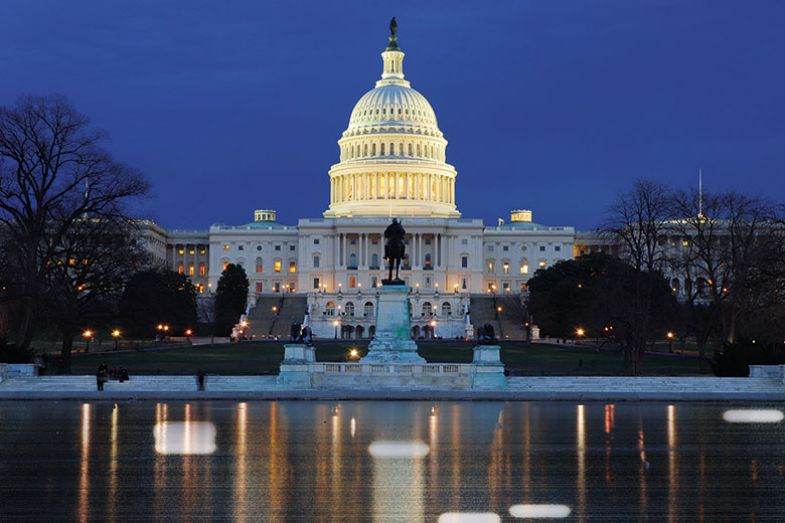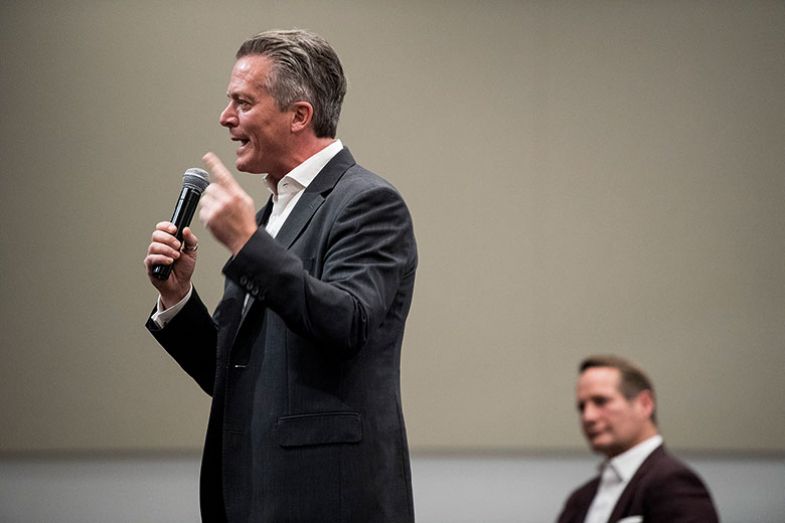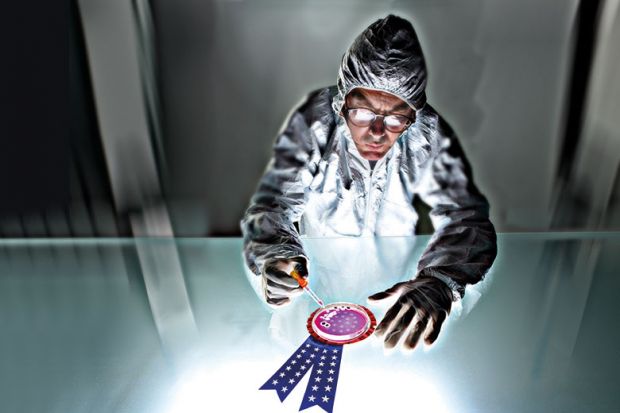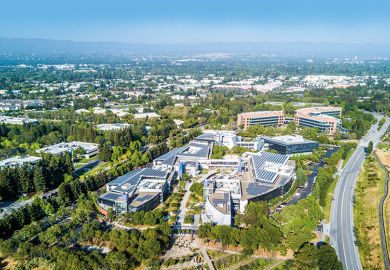Former neurobiology professor Hans S. Keirstead got outmanoeuvred by a wealthy real estate mogul. Harvard medical scientist Eric L. Ding could have used a bit more time to connect with voters. Computer science professor Patrick H. Madden dropped out when a better-known Democrat got in.
Two years after the election of Donald Trump left scientific leaders alarmed and vowing to get more of their own into elected office, the midterm elections next month are already a lost cause for university scientists. Few academics ultimately put themselves forward for the first national election since Trump’s victory, which takes place on 6 November. And none got past the primary rounds.
That kind of failure rate is expected for first-time candidates. Yet the scientists may also be overestimating the degree to which the US public actually values contemplative, analytical assessment in the skillsets of its political leadership.
“The scientific background did not carry as much weight as probably we all anticipated,” says Madden, now back at his job as an associate professor of computer science at Binghamton University in New York state. “It surprised me. The theory was that people would take us seriously, believe that we are honest and truthful, and that we’re smart and capable.”
It is, of course, more complicated than that. Professional educators of various kinds already account for 101 of the 535 members of the House of Representatives and the Senate, with at least eight of them being former professors. Many more members of Congress have science backgrounds, including two dozen doctors, eight engineers, six software company executives, a physicist, a microbiologist and a chemist.
But only two have doctoral degrees in the sciences; the professors now in Congress almost exclusively come from law, political science or business fields. Actual scientists bringing an active or recent university affiliation – and thereby having “science” as a key aspect of their identity – remain conspicuous by their absence.
The few who tried to redress that situation this year encountered a variety of obstacles, many specific to the races in which they ran. Common hindrances, however, included difficulties with job and schedule flexibility, and insufficient financial or community ties. But, for now, the losing candidates maintain a common commitment to keep trying, given what they see as the urgency of getting more scientific voices into the nation’s governing structures.
The 2016 election “was a train wreck – just terrifying”, says Madden. He was raised in a poor section of Detroit, and often went hungry while working blue-collar jobs in his youth; he fears the Trump presidency is worsening conditions for those in similar circumstances.

Patrick H. Madden
The day after Trump’s victory, Madden stood before his freshman class, deeply fretful but ready to explain computer programming hierarchies. “There was a batch of about six girls who would sit in the front row, and three were not there,” he recalls. “The other three had a glassy look in their eyes, and were as freaked out as me.”
Others in the class included many first-generation immigrants. “I’m looking out at this room and all these folks – their lives had just gotten harder.”
Madden soon began contemplating his local congressional district, represented by Claudia Tenney, a former radio talk-show host who strongly backs Trump. While rural and 90 per cent white, the district has a history of backing lawmakers from both major parties. The moment also was personally opportune. Madden already had been considering a career switch into industry, and had started paring back his graduate student commitments. He also had available sabbatical and leave time.
After “a month of staring at the ceiling every night thinking: ‘What the hell do we do?’ ” Madden reached a decision. “OK, I’ll jump into the fire,” he thought, “because I don’t know if anybody else will.”
He also had someone to jump with him. A scientist friend on Long Island, Elaine DiMasi, was just reaching a similar conclusion, quitting her job as a physicist at the US government’s Brookhaven National Laboratory to challenge Lee Zeldin, another Trump-supporting House Republican.
With little practical idea of how a campaign actually works, Madden called on 314 Action, a group founded in 2016 to help scientists to run for office. Named after the first three digits of pi, the group got him going with basic candidate training and help finding campaign staff.
“They understand that I’ve never done this before – I don’t have any idea what I’m doing,” Madden says. “But it seemed like it was a plausible thing that could actually work out.”
Madden waited until the summer break in 2017 to announce his candidacy without the distraction of classes. He planned to use that summer to “get some momentum” in critical areas such as fundraising, then teach in the fall, and take off this spring and summer for campaigning.
But before his campaign even got started, it ended. A Democrat serving in the New York state legislature, Anthony Brindisi, announced in June 2017 that he also planned to challenge Tenney. One week later, Madden bowed out.
With his computer background, Madden figured that if tech industry enthusiasts latched on to his campaign, he might have raised a lot of money quickly, and other Democrats would have stood aside. But when Brindisi moved even quicker, Madden concluded that “I’d probably do more harm than good if I ran against him”. Since then, Madden has campaigned on behalf of Brindisi, who appears in polls to have a slight lead on Tenney.
“He’s not a scientist,” Madden said of Brindisi, “but he’s a perfectly rational guy.”

No truck: attacks on reason and knowledge during Trump’s presidency have led to more scientists entering the political fray
That rationality is part of what 314 Action preaches. Founder Shaughnessy Naughton, a former industry chemist, created the group after losing consecutive bids for a House seat in her home state of Pennsylvania. More than 7,000 scientists have now contacted 314 Action for advice, and the group has trained some 1,400 of them for campaigns at the federal, state and local level.
However, Naughton says that she is increasingly mixing encouragement with words of warning.
“I spend more time talking people out of running – almost – in the sense of [pointing out that] running for Congress is not a simple thing,” she says. Candidates need to be prepared both financially and mentally, and their families also need to be on board, because “it’s not 40 hours a week – it’s 100”.
Having cast his hat unsuccessfully into the ring, Ding also understands the trade-off. He gave up a faculty position at Harvard University’s School of Public Health to run for Congress in his home district in the Harrisburg area of Pennsylvania. Although raised there from the age of 5, when his family immigrated from China, Ding realised that he’d face accusations of being a carpetbagger if he kept his Harvard job while campaigning in an area where less than a fifth of voters have a college degree.
In a career focused on improving public health, Ding increasingly recognised that solutions often require experts to get more directly involved in political processes. By that measure, he felt, the Trump victory was a dangerous setback. “I realised that, as scientists, we cannot just be sitting back and waiting for someone to hear us,” he explains.
An opportunity arose thanks to redistricting. Pennsylvania’s Supreme Court, in February, created new congressional district boundaries after finding that the state’s existing map was unfairly drafted to help Republicans win more seats than their support warranted. However, candidates were left with very little time to adjust to the new district lines. And although Ding was among the four out of eight declared Democrat candidates that gathered enough voter signatures to be placed on the primary ballot, the 10-week sprint to the 15 May poll was not enough time for an Asian Ivy Leaguer in an economically stressed district that is 94 per cent white to remind voters of his humble local roots.
The winner of the Harrisburg primary, pastor and army veteran George Scott, took 36 per cent of the vote. Ding got half as much, finishing third.

Eric L. Ding
Scott is now in a close race with the Republican incumbent, Scott Perry, another army veteran who is closely aligned with Trump and his politics. Like Ding, Scott has no previous political experience, and left town to pursue his career. But the Perry-Scott matchup highlights the low value that US voters typically place on academic achievements, relative to more supposedly glamorous pursuits, such as Scott’s military excursions in Panama, Kuwait and Iraq.
Ding’s résumé includes finishing an undergraduate public health degree at Johns Hopkins University in three years, and earning dual doctorates at Harvard even faster. He’s worked on public health programmes helping adolescents in Denmark and refugees in the Middle East. He’s helped detail serious problems with drugs such as Vioxx and Celebrex. He founded web-based systems to alert people of toxins in drinking water and to share cancer prevention strategies.
In individual encounters on the campaign trail, Ding says he was connecting. Voters were beginning to understand that he was a local man – his parents chose “Eric”, he says, because it is the only name spelled out in “America” – who had travelled the world improving lives and now wanted to help his home community. Some told him, “I’m so glad you’re not like Sheldon” – referring to a popular US television series that centres on a child prodigy who lacks basic social skills.
And while money proved a major hurdle for Madden, Ding had no trouble in that department thanks to his experience on other campaigns (having long envisioned his own political career) and the numerous business connections made through his entrepreneurial work. The $300,000 he raised in the 10-week window was four times as much as Scott raised. But while money counts for a lot in US politics, Ding found that it isn’t everything.

Academic community: protesters outside the White House during the March for Science in 2017
Keirstead did even better financially in his southern California race. He raised more than $2 million and only just missed out, in what appears to have been this year’s tightest primary. His fundraising ability was no doubt helped by the fact that he is closer than most academics are to the corporate world, having left a faculty job at the University of California, Irvine in 2015 to concentrate on a company he created to convert his pioneering stem-cell discoveries into medical therapies.
Although a native of Canada, Keirstead has what Americans would admire as a classic rags-to-riches life story. Raised by a single mother on a farm, he spent many days unsure if he and his family would have a meal come dinnertime, despite his undertaking paid work from the age of 9. But he persevered to earn an undergraduate degree in neurobiology from the University of Cambridge and a doctorate from the University of British Columbia. His work in the new and politically charged field of stem-cell research – which was defunded by the administration of George W. Bush on ethical grounds – gave him close exposure to the intersection of science and government.
So when Trump took office threatening a widespread erosion of consumer protections, Keirstead felt that the time had arrived. His home district near Irvine has been held for 30 years by Dana Rohrabacher, a longstanding and especially combative conservative whose uniquely staunch support of both Trump and Russian president Vladimir Putin has left him vulnerable this election cycle.
Describing his motivation to run, Keirstead cites frustration with politicians who don’t see realities that a scientist would recognise. Without a scientist in the room, a congressional debate over imports of Chinese chairs almost certainly won’t involve an assessment of the toxins from Chinese manufacturing processes that eventually will pollute US landfills, he says. And while an increase in Congress’ scientific quotient “is not the cure-all, by any means, it provides a perspective that is absolutely lacking”.
That is a point being made repeatedly by Rush Holt Jr, one of the era’s most successful academic-politicians. Holt was a Princeton University professor serving as assistant director of the US government’s Plasma Physics Lab when he ran for Congress in 1996. He lost, then ran again two years later and won, beginning a 16-year stint in the House that ended in 2015 after he declined to seek re-election.

Scientists can write analyses and lobby lawmakers, says Holt, whose father was a senator and whose mother served as West Virginia’s secretary of state at the end of the 1950s. But it’s critical, he adds, for some to serve in office and sit “at the table when the issue is being discussed”.
Now chief executive officer of the American Association for the Advancement of Science, Holt is cheering on scientist candidates while sympathising with their struggles.
“Getting elected is hard work, with a lot of luck involved,” he says. “And it calls on skills that are not generally exercised in the science community.”
The scientific community also needs patience, adds Julie McClain Downey, senior director of campaign communications at Emily’s List, a group dedicated to helping women get elected to political office.
Emily’s List was founded in 1985, and has inspired numerous imitators among groups seeking to elect people of particular backgrounds. Yet women still only comprise a fifth of Congress members.
“It takes time,” Downey says. “Emily’s List has been doing this work for 33 years. And only now are we seeing this massive wave of women running at the rate where we could even imagine getting close to parity.”
For scientists, many of whom are aligning with Democrats, just winning party support seems a challenge. Keirstead’s is a case in point. His district south of Los Angeles looks promising for Democrats because its residents, while generally wealthy and conservative, are also better-educated than those in Madden’s New York or Ding’s Pennsylvania. The district is also barely majority-white, with Hispanics making up a fifth of the population and Asians almost as much, leaving Rohrabacher’s anti-immigrant positions another potential liability.
But that environment also attracted Harley Rouda, a wealthy real estate executive who has long voted Republican and donated to Republicans, but decided to run as a Democrat. Having well out-raised Rouda, Keirstead seemed within reach of winning. But, according to Keirstead, the national Democratic party felt that Rouda could draw from his own personal wealth in the general election, and so gave him $400,000 to pay for television ads in the final days of the primary campaign. By contrast, the party gave Keirstead “nothing”, and Rouda won by 126 votes, out of 190,000 cast.

Hans S. Keirstead (left) and Harley Rouda
But 314 Action is not dissuaded. Overall, the group endorsed two candidates for the Senate and 20 for the House. Both Senate contenders and 11 of the House challengers made it to the general election. And the 22 primary races had a combined total of 141 other candidates on the ballots. “Those numbers are pretty good,” Naughton believes.
Yet many of her group’s 13 final-round endorsees are medical professionals – including several doctors and physicians – or business executives with scientific backgrounds. They don’t necessarily address what Keirstead and others see as the value of having practising scientists in the room when key public policy debates are settled.
To get there, more practising scientists may need to meet voters at least halfway, says David Hopkins, an associate professor of political science at Boston College. Scientists cannot expect many voters to accept the idea – perhaps too common in academia – that political disagreements can be solved with better information, and that “real experts know what’s right and wrong”, Hopkins says.
“That’s a very old idea. But it’s an idea that most people don’t really subscribe to. It’s hard to make the pitch to voters that they should just put a bunch of smarty-pantses in charge and not worry about anything any more.”
But Naughton points out that there are alternative avenues for scientists to wield some influence over public life. Running for a local school board is a great example, she says. Such low-profile volunteer positions provide a natural fit for educators who may be squeamish about playing the political game of constantly repeating themselves to voters, expressing confidence when facts are ambiguous and pleading for money and support.
Abdul El-Sayed, a former assistant professor of epidemiology at Columbia University, is among those searching for a meaningful role. Worried about problems such as childhood lead exposure and feeling that an academic career “wasn’t going to contribute to the outcomes I care so much about”, he left Columbia in 2015 to become health director for the city of Detroit. But that role didn’t satisfy either. A chief frustration was watching state officials let the international food company Nestlé take hundreds of millions of gallons of water from public reservoirs, against overwhelming public opposition and for almost no charge, while thousands of Detroit residents got their home service disconnected over unpaid bills. So El-Sayed resigned early last year to run for Michigan governor.
He lost August’s primary to Gretchen Whitmer, the Democratic leader in the Michigan state Senate, by a margin of 52 per cent to 30 per cent. Nevertheless, he remains committed to the political arena. So while he has taken an adjunct position at the University of Michigan, he is not looking to return to a full-time faculty position. “That’s not for me right now – maybe later,” he says. “There’s too much else I want to do.”

Abdul El-Sayed
Not all professors, however, should make the same choice, El-Sayed says: “Sometimes we in academia discount the value of teaching. And one of the most important things we can teach young people is to stay involved and to stay engaged.”
Madden feels much the same. His experience of running for Congress has given him some perspective on the societal value of his job as a professor – and on the politicians who so often claim to be “job-creators” merely by voting to lower taxes and ease protective regulations. “We make jobs here,” he says of Binghamton University. “We make people who get good-paying jobs.”
Hopkins anticipates that if academic politicians do become a meaningful force, it likely will begin around college towns, where voters are more likely to welcome professorial involvement in local politics. And he urges academics to keep trying.
“We know that political engagement and political activity does not guarantee a pay-off,” Hopkins says. “But we do know that political inactivity and political disengagement is very unlikely to gain a pay-off.”
If universities want to help – recognising that they too may benefit from a more informed brand of public policy – Naughton, Holt and Hopkins all have a suggestion: look at the walks of life from which people are getting elected to Congress.
Beyond the career politicians, Congress is dominated by those with backgrounds in business and law. This is because running for federal office is a full-time job, and getting the necessary leave is much easier for people who own their own business or work at law firms. Such organisations also recognise the value of having allies in public office, Naughton says. Law firms, for instance, not only allow time off for campaigns, but actively encourage it, even throwing fundraisers and contributing directly to associates’ campaign funds. “I don’t think that law firms necessarily do that out of the goodness of their hearts,” Naughton observes.
The AAAS’ Holt agrees. He believes that universities should consider offering sabbaticals or training specifically designed to help faculty who may want to run for office. He used vacation time and “a few months” of unpaid leave from Princeton in his 1996 congressional run, but then took advantage of a severance offer to quit Princeton entirely for his successful 1998 bid.
Whether any of science’s current crop of disappointed would-be politicians will run again remains to be seen. But none of them are ready yet to rule it out.
“We’re down but not out,” Ding says. “Science is a long journey. It’s not an overnight sensation.”
Paul Basken is THE’s North America editor.
POSTSCRIPT:
Print headline: Power drill
Register to continue
Why register?
- Registration is free and only takes a moment
- Once registered, you can read 3 articles a month
- Sign up for our newsletter
Subscribe
Or subscribe for unlimited access to:
- Unlimited access to news, views, insights & reviews
- Digital editions
- Digital access to THE’s university and college rankings analysis
Already registered or a current subscriber?








